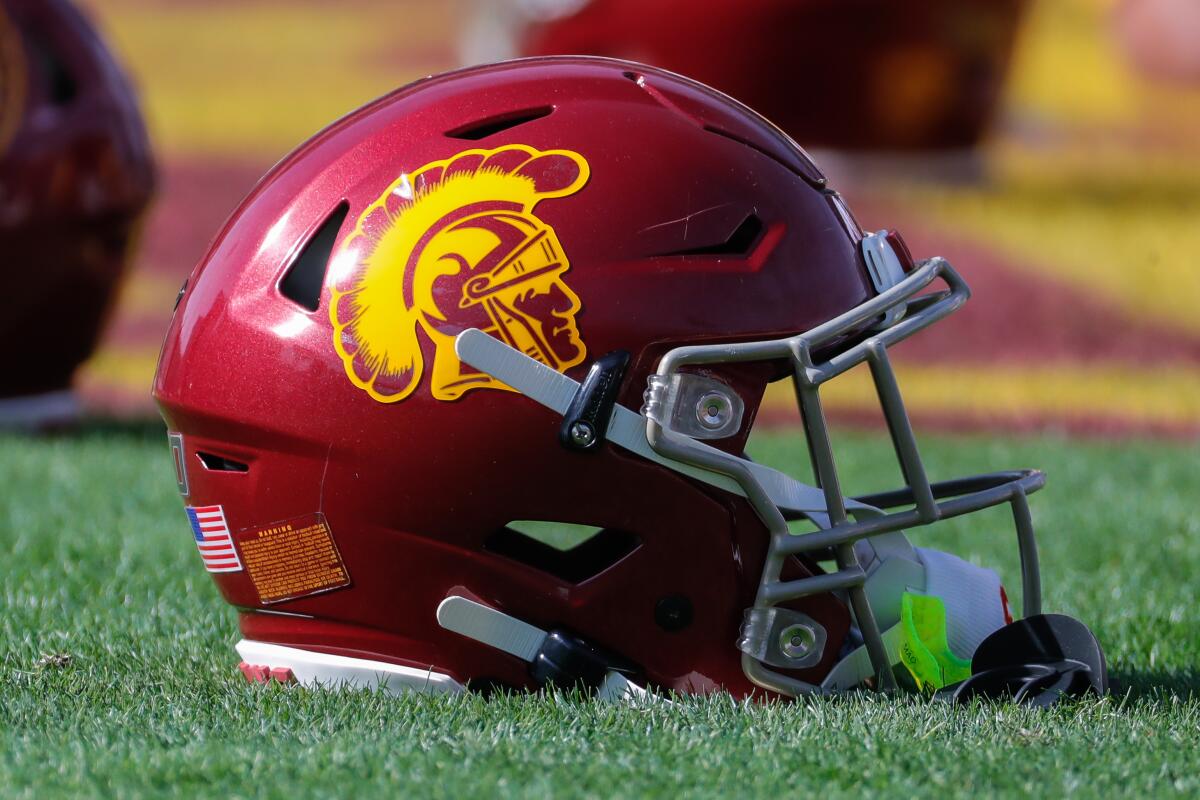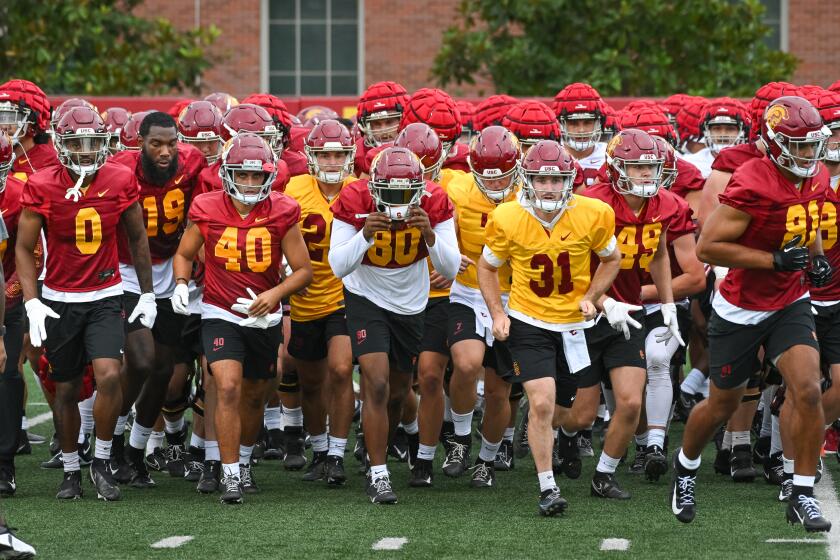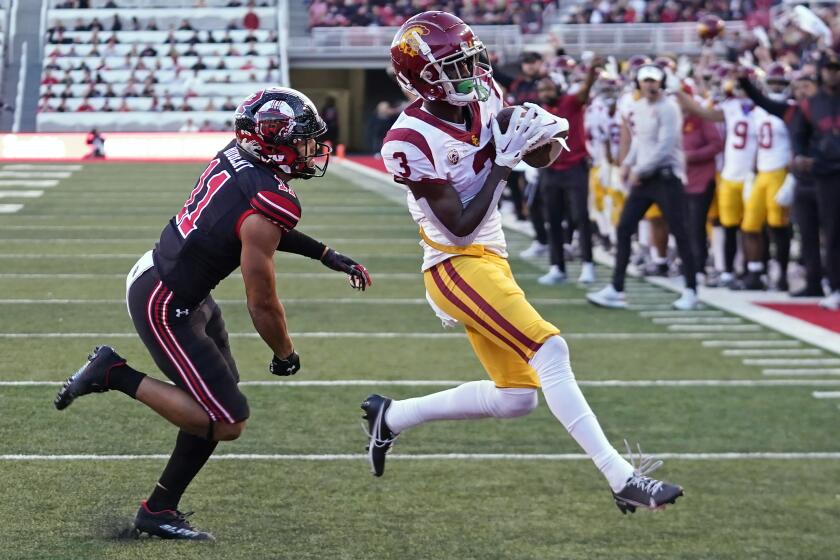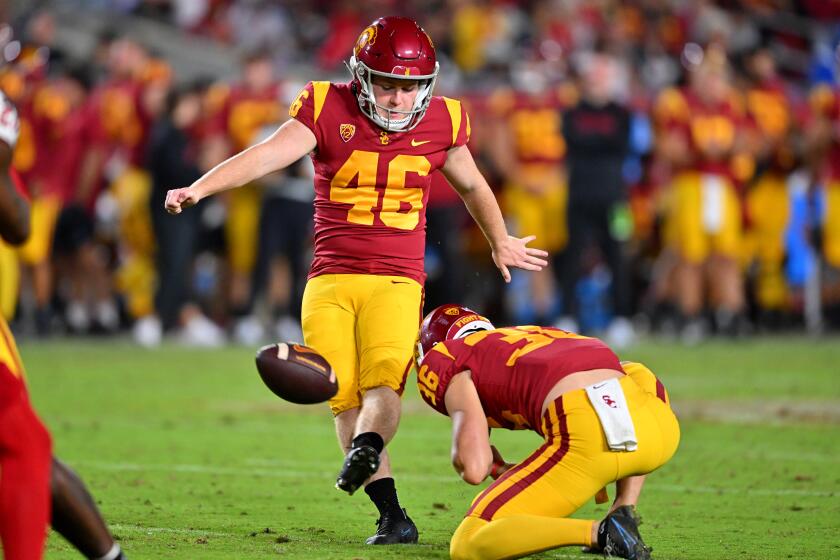Student Body Right USC NIL collective shuts down after death of founder

- Share via
Just a few days before he died, Dale Rech answered a call from his hospital bed.
Bill Hadden wanted to discuss Student Body Right, the collective for name, image and likeness that he and Rech launched at USC in August against the university’s wishes. Namely, Hadden worried it was falling apart.
USC and its in-house, NIL operation, BLVD, had made clear on many occasions that it viewed Student Body Right and its plan to pay every Trojans football player “the equivalent of a base salary” as an existential threat. Earlier that week, Rech had taken another call from his hospital bed — this time, with Mike Bohn, USC’s athletic director, who remained resolute in his belief about the potentially damaging presence of a donor-run collective.
The open opposition from USC made matters difficult, Hadden admitted. Fundraising proved more of an uphill battle than anticipated. Several potential donors, Hadden said, expressed concerns to him about repercussions from the school if they supported Student Body Right.
USC athletic department leaders have opposed the creation of ‘Student Body Right,’ an NIL group created by deep-pocketed donors and diehard fans.
Then, there was the matter of Rech’s health. His kidneys were failing. He had a blood clot in his calf. Doctors were discussing inserting stents in his heart. Hearing him over the phone that day, Hadden worried: His friend didn’t sound good.
Rech was the one who’d willed Student Body Right into existence. He’d fought for weeks from his hospital bed to keep the collective alive, even offering at one point to front the first year himself. But now his own health was failing. Hadden asked if he was physically capable of carrying it any further.
“I don’t think I am,” Rech admitted.
Less than two months after it launched, they decided together to shut down Student Body Right.
It was the last conversation the two longtime friends would have. Rech died a few days later on Sept. 26.
“I think he knew, deep down, that he was getting ready to go,” Hadden told The Times. “This kept him going. He thrived on it.”
Until his health began to fail last month, Rech hadn’t offered much indication he was planning to shutter the new collective. Over several conversations in August and early September, Rech shared with The Times plans for expanding Student Body Right, using defunct Trojans alumni clubs as a fundraising network. With an eye on that future, the collective had applied for — and was granted — status as a 501c3 charitable organization. It also signed a partnership with the NIL marketplace Opendorse, which was expected to handle compliance and other logistical questions for the collective. Other deals were in the works.
USC lost unexpectedly to Utah last week, but coach Lincoln Riley was in similar situations at Oklahoma and earned a College Football Playoff spot.
But obstacles were apparent even before Rech spent the last month of his life in the hospital. In his last phone call with The Times, Rech wondered aloud if those efforts were worth the trouble.
Rech told The Times before his death that, since August, he had conversations with Bohn as well as Mike Jones — the CEO of Stay Doubted, the outside media agency that partnered with USC to create BLVD — about working in concert with the university’s in-house operation.
But administrators remained steadfast in their opposition. Bohn and Jones expressed concern to The Times after its launch in August that any collective outside of the oversight of the university would invite NCAA scrutiny.
Rech, in response, insisted Student Body Right had no intention of getting involved in recruiting, where NCAA rules governing NIL regularly blurred.
“This is a standalone collective, with no affiliation or ties to the university,” Rech said in August. “The NCAA cannot go back at the university as long as we’re in compliance and stay within what the guidelines of the NCAA and state require. There’s no blowback from us on the university. They just want control.”
USC kicker Denis Lynch won the starting job this season and has become an Instagram star thanks, in part, to his viral pregame outfits and unique personality.
In the meantime, BLVD officially launched in late August, advertising itself as a “collective-plus”.
“We very much believe in the BLVD concept, not only for what it can do for our student-athletes but also making sure that we stay within the rules, and having people that have been in this business and are experts in this field is very, very important to us,” USC football coach Lincoln Riley said in August, when asked about the new donor-run collective. “Listen, this is new to all of us. It’s still evolving all kinds of places all over the country, and I’m confident we will be able to bring everyone together and make sure it’s one united effort.”
Resentment simmered between the two sides as Student Body Right moved forward with plans to pay Trojans football players a base $50,000 salary starting in January.
But those plans never came to fruition.
Hadden hasn’t completely given up hope that Student Body Right could one day regain its footing. But without Rech — and his rolodex of USC alumni contacts — ushering the collective along, any path forward for Student Body Right remains unlikely.
Hadden is still convinced, however, that USC and its now-defunct collective could’ve worked together had the circumstances been different.
“It’s just too bad,” he said.
More to Read
Go beyond the scoreboard
Get the latest on L.A.'s teams in the daily Sports Report newsletter.
You may occasionally receive promotional content from the Los Angeles Times.










